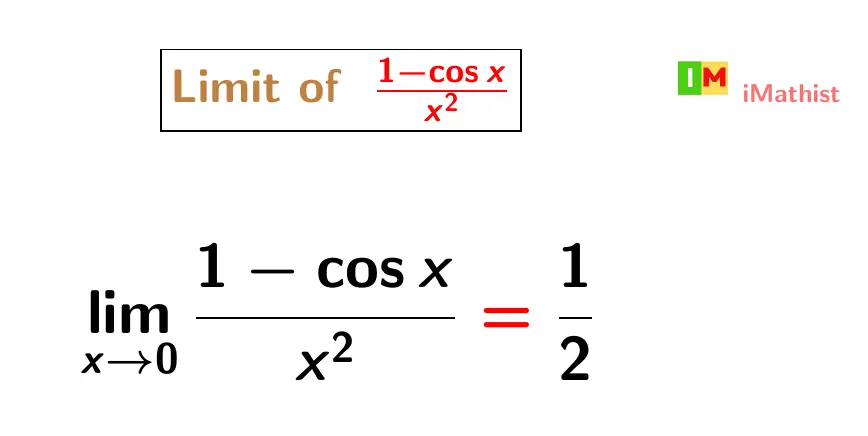The limit of (1-cosx)/x^2 as x approaches 0 is equal to 1/2. That is, limx→0 (1-cosx)/x2 =1/2. This limit can be computed using the formula
limx→0 $\dfrac{\sin x}{x}$ = 1 …(∗)

Prove that limx→0 (1-cosx)/x2 =1/2
We have
limx→0 $\dfrac{1-\cos x}{x^2}$
= limx→0 $\dfrac{2 \sin^2 \frac{x}{2}}{x^2}$ using the formula 1-cos2x=2sin2x.
= limx→0 $\dfrac{2 \sin^2 \frac{x}{2}}{(\frac{x}{2})^2 \times 4}$
= $\dfrac{1}{2}$ limx→0 $\dfrac{\sin^2 \frac{x}{2}}{(\frac{x}{2})^2}$
[Let x/2 =h, so h→0 as x→0]
= $\dfrac{1}{2}$ limh→0 $\dfrac{\sin^2 h}{h^2}$
= $\dfrac{1}{2} \big( \lim\limits_{h \to 0} \dfrac{\sin h}{h} \big)^2$
= $\dfrac{1}{2}$ × 12 by the above formula (∗)
= 1/2.
So the limit of (1-cosx)/x^2 is equal to 1/2 when x tends to 0.
More Limits:
FAQs
Q1: What is the limit of (1-cosx)/x^2 when x tends to 0?
Answer: The limit of (1-cosx)/x2 when x tends to 0 is equal to 1/2, that is, limx→0 (1-cosx)/x2 =1/2.